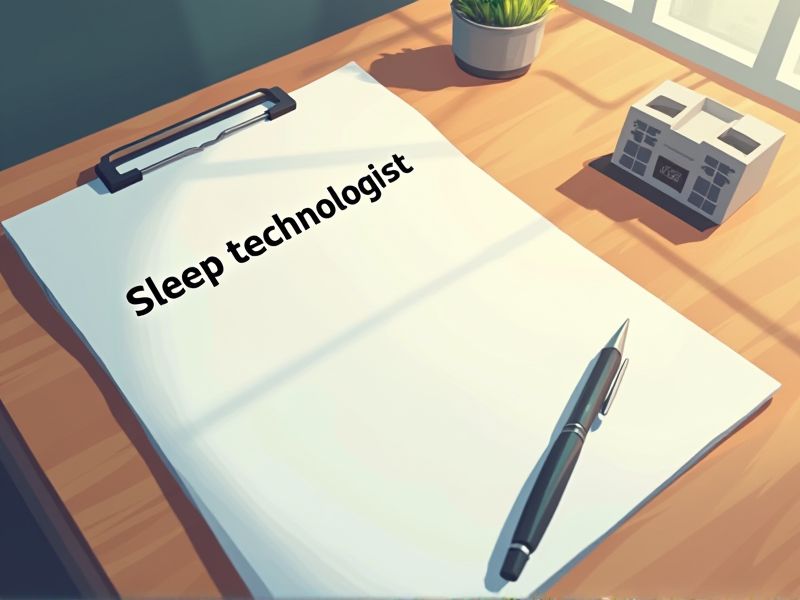
Sleep technologists play a crucial role in diagnosing and managing sleep disorders, which requires specialized skills and knowledge. Certification ensures they have the necessary understanding of sleep physiology, testing methods, and patient care. Through certification, sleep technologists can demonstrate their competence and commitment to maintaining high standards in the field. Important certifications to consider for a sleep technologist include RPSGT and CCSH.
Registered Polysomnographic Technologist (RPSGT)
Registered Polysomnographic Technologists are essential because they possess specialized training to perform comprehensive sleep studies. Their expertise ensures accurate diagnosis of sleep disorders, aiding physicians in developing effective treatment plans. RPSGT certification reflects a standardized level of competence, which is crucial for maintaining high-quality patient care. The presence of an RPSGT in sleep technology boosts patient trust and confidence in the care they receive.
Basic Life Support (BLS) Certification
Basic Life Support (BLS) certification equips sleep technologists with essential skills to respond to cardiac emergencies during sleep studies. Sleep disorders may increase the risk of respiratory or cardiac events, making immediate intervention crucial. BLS training enhances their ability to maintain patient safety and provide critical care when necessary. Holding a BLS certification aligns with healthcare standards, ensuring comprehensive patient care in sleep centers.
Advanced Cardiovascular Life Support (ACLS) Certification
Sleep technologists often encounter patients with complex health conditions, including cardiovascular issues like sleep apnea, which increases the likelihood of cardiac events. Obtaining ACLS certification equips sleep technologists with critical skills to respond effectively to cardiovascular emergencies. This certification ensures they can stabilize patients until further medical intervention is available. Hospitals and sleep centers may prioritize hiring or retaining staff with ACLS certification to enhance patient safety and care quality.
Pediatric Advanced Life Support (PALS) Certification
Pediatric Advanced Life Support (PALS) Certification equips sleep technologists with essential skills for recognizing and responding to pediatric emergencies during sleep studies. Sleep technologists sometimes encounter situations where a child might experience life-threatening respiratory issues, and PALS training ensures prompt and effective action. In a clinical setting where timely interventions can save lives, having PALS certification enhances the overall safety and care quality for pediatric patients. Certification also demonstrates a commitment to maintaining high professional standards and competence in handling potential emergencies.
Sleep Disorders Education Certificate
Sleep technologists need a Sleep Disorders Education Certificate to ensure they possess the essential knowledge about various sleep disorders, which directly impacts their ability to accurately monitor and analyze sleep patterns. Holding this certification enhances their understanding of the latest diagnostic and therapeutic techniques, leading to improved patient care and outcomes. The certificate validates their expertise, increasing trust among patients and employers while opening up more job opportunities. With comprehensive training, they become more effective in educating patients about their sleep health, leading to better adherence to treatment plans.
Electroencephalography (EEG) Technologist Certification
Certification in Electroencephalography (EEG) for Sleep Technologists enhances their ability to accurately diagnose sleep disorders by understanding the brain's electrical activity. It ensures adherence to standardized protocols, leading to reliable and consistent patient assessments. Gaining certification elevates a technologist's expertise, directly impacting their professional credibility and career advancement opportunities. Certified EEG skills equip technologists to address complex neurological cases associated with sleep disturbances efficiently.
Cardiorespiratory Technology Certification
Sleep technologists benefit from Cardiorespiratory Technology Certification because it equips them with essential knowledge about cardiac and respiratory systems, enhancing their ability to monitor and interpret related physiological signals during sleep studies. This certification ensures that sleep technologists can accurately identify and differentiate between sleep disorders and potential cardiac or respiratory issues that could impact patient health. Compliance with industry standards through certification assures healthcare facilities that certified technologists possess the necessary expertise to deliver quality care. In the context of healthcare regulations, certification likely increases a professional's competitive advantage in the job market, facilitating career advancement.
Medical Equipment Calibration Certification
Calibration certification ensures that medical equipment used by sleep technologists operates accurately, which is critical for diagnosing sleep disorders reliably. Inaccurate data from uncalibrated equipment can lead to misdiagnosis, affecting patient treatment plans. Certification provides validation that equipment meets industry standards, reducing legal liability for medical facilities. Regular calibration enhances equipment lifespan, minimizing costs related to frequent repairs or replacements.
HIPAA Compliance Certification
A sleep technologist handles sensitive patient information while conducting tests, making HIPAA compliance necessary to ensure data privacy and security. Violations of HIPAA can lead to significant fines and legal consequences, creating a substantial risk for healthcare facilities. Certification in HIPAA compliance enhances the technologist's credibility and trustworthiness, assuring patients that their health information is protected. Compliance training improves overall knowledge, enabling the technologist to prevent potential data breaches during patient interactions.
Patient Safety Certification
Earning a Patient Safety Certification for Sleep Technologists enhances their ability to identify and mitigate risks during sleep studies, directly improving patient outcomes. It ensures they are well-equipped with the latest protocols and guidelines, reducing the likelihood of errors in diagnosis or treatment. Certifying sleep technologists fosters a culture of accountability and continuous improvement within healthcare facilities, leading to increased trust from patients and caregivers. Staying updated with safety practices through certification facilitates compliance with regulatory standards, thereby decreasing legal liabilities for healthcare providers.
Summary
When you, as a sleep technologist, obtain certifications, you enhance your professional credibility. This achievement can lead to increased job opportunities and higher potential earnings. Certification also equips you with advanced skills, improving patient care quality. Employers may prefer or require certified technologists, increasing job security.
